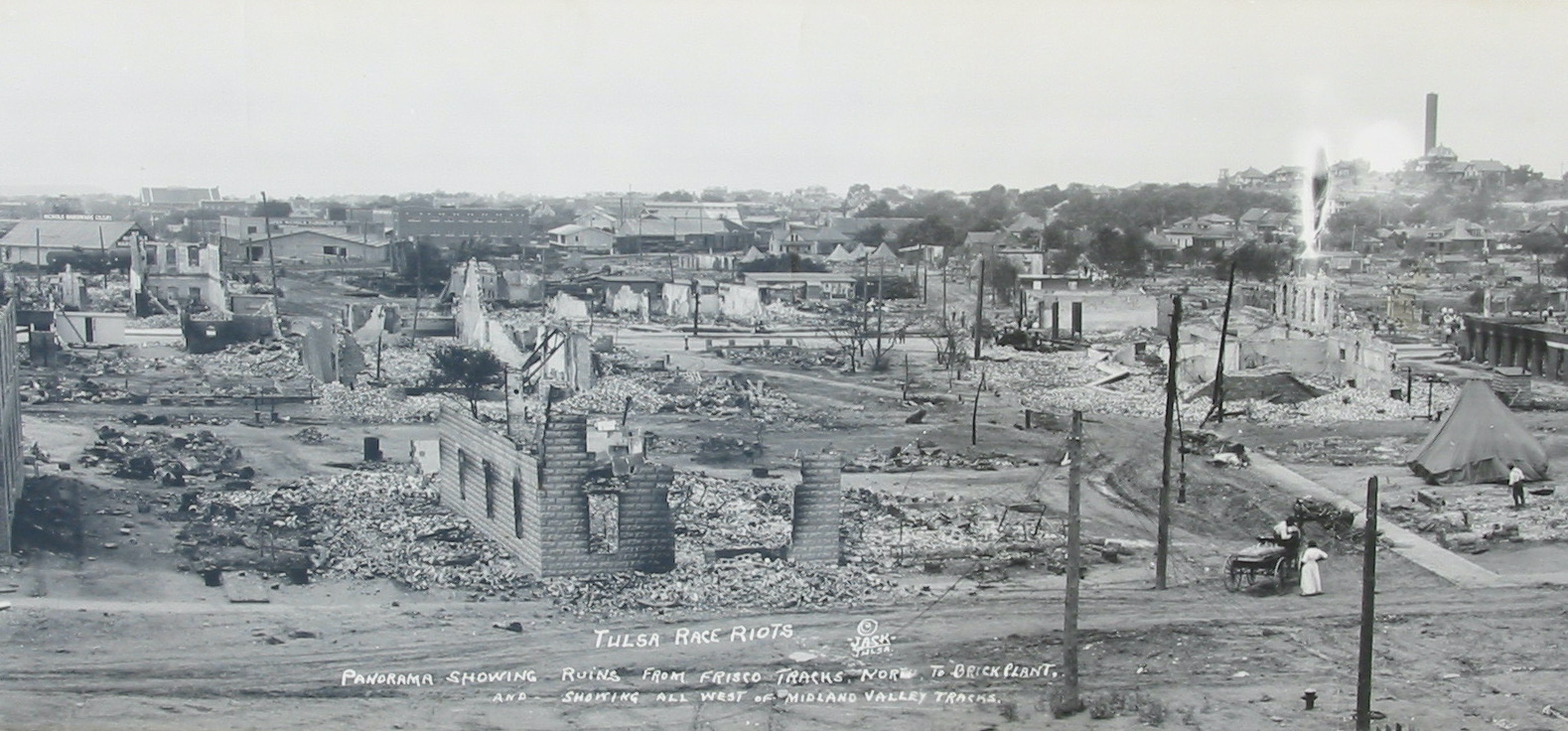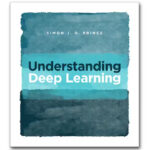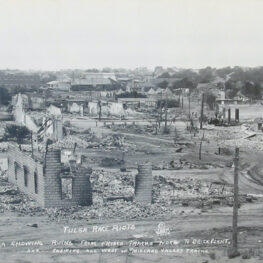Categories
 OVERVIEW
OVERVIEW
This undergraduate course is designed for juniors and seniors and covers advances in Artificial Intelligence (AI) relevant to historic forensic investigation. Through a series of project-based assignments that focus on topics presented in lectures and discussions, students work in groups to develop neural network architectures, data analysis and 3D reconstruction methods to support the ongoing investigation of the Tulsa Race Massacre (TRM) of 1921. This catastrophic event resulted in the loss of lives, homes and the decimation of the thriving business district of Greenwood. Forensic scientists, historians and other specialists on the TRM investigative team, and descendants of TRM survivors interact with students through guest lectures and a field trip to Tulsa investigation sites to solve computational problems related to social network reconstruction, human identification and 3D reconstruction from multimedia data analysis. Project outcomes will be presented as a holographic display at the Greenwood Cultural Center (GCC) in Tulsa Oklahoma.
Click here for Guest Speaker Bios and Talk abstracts
OBJECTIVES
This course introduces students to techniques that use neural networks to solve problems related to social network reconstruction, human identification, multimedia data analysis and 3D reconstruction for historic forensic investigations. The goal of the Tulsa Race Massacre Investigation (TRMI) is to apply the power of modern forensic science to locate, identify and repatriate victims of the race massacre. Sparse records create an urgency to consider novel or atypical data analysis techniques (that surpass existing photogrammetry tools, digital mapping, statistical analysis, and the interfaces of genealogical platforms). Students consult with select investigators from the TRMI team and leverage technical advancements in AI to support the TRMI goals. There is an emphasis on reconstructing the true stories of the women of Greenwood who are poorly represented as victims of TRM.
Instructor: Dr. Corey Toler-Franklin, Computer Science Department, Barnard College, Columbia University
Contact: Office Milstein 502B, ct3219@columbia.edu
Office Hours: TBD
Location:
Time: MW 4:10pm-5:25pm
Course Management: CourseWorks
PREREQUISITES:
Prerequisites: COMS W3157 Advanced Programming (or equivalent proficiency in C, C++, and/or Python), Linear Algebra: MATH UN2010 or MATH UN2015 (or equivalent knowledge of vectors and matrices). Familiarity with the basics of machine learning and working with neural networks is strongly recommended but not required. The course begins with an introductory-level review of neural networks.
**Contact instructor if you are not sure you are prepared for the course**
TEXTBOOK
Required
  |
Title: Understanding Deep Learning
Author: Simon J.D. Prince |
SYLLABUS
COMS BC3997 Section TBD AI Investigation of 1921 Tulsa Massacre
COURSEWORK
35% Programming Assignments (4)
15% Written Homework (1)
25% Final Project
15% Group Report
10% Class Participation
Grading Policy
98-100 A+ 4.33
93 – 97.9 A 4.00
90.0 – 92.9 A- 3.67
87-89.9 B+ 3.33
83-86.9 B 3.00
80-82.9 B- 2.67
77-79.9 C+ 2.33
73-76.9 C 2.00
70-72.9 C- 1.65
60-69.9 D 1.00
below 59.9 F 0.00
Attendance Policy, Class Expectations, and Make-Up Policy
Students are expected to attend class. Repeated non-excused absences (more than three) may impact your grade. Make-Up homework, projects and exams must be coordinated with the instructor. Excused absences must be consistent with your college’s Absence and Attendance Policy.
Guidelines for assignments
There is an emphasis on developing GPU programming skills while implementing concepts learned for real historic forensic science investigation. Students complete 4 programming assignments and a final project using a GPU cluster and datasets from the Tulsa Race Massacre onsite findings. Project examples include generating a 3D neural rendering of archived panoramic images of Greenwood before and after the 1921 Race Massacre, colorizing and animating the 3D representation. The final project is designed by the student but must be approved by the instructor. Each student (team) generate a final report that combines the results and findings from each project. The 3D reconstructions will be made available as a holographic display at the Greenwood Cultural Center in Tulsa, Oklahoma (and reports possibly archived). Ten percent of your grade is based on your engaged participation in class and online discussion. The instructor will provide detailed assignment guidance/instructions with support material.
Late Policy:
Students are given five late days total for the course. Students can use late days without penalty for projects (1-4). Late days cannot be used for the final project, homework, or take-home exam.
There is a 10% per day late deduction up to a maximum of a 50% reduction for late programming projects (after applied late days). Students are expected to submit all programming assignments (even if they are late).
To use the late days, you must notify the instructor in writing (email) by the assignment due date and receive a confirmation email from the instructor. When you submit your project, you must indicate the number of late days you are using.
You do not have to use your late days if you have a university allowed absence and supporting documentation. See your college’s Absence and Attendance Policy.
The homework solutions are posted quickly as a study aid for the take-home exam.
***NO LATE HOMEWORK accepted except for a university allowed excuse. ***
Honor Code
We, the students of Barnard College, resolve to uphold the honor of the College by engaging with integrity in all of our academic pursuits. We affirm that academic integrity is the honorable creation and presentation of our own work. We acknowledge that it is our responsibility to seek clarification of proper forms of collaboration and use of academic resources in all assignments or exams. We consider academic integrity to include the proper use and care for all print, electronic, or other academic resources. We will respect the rights of others to engage in pursuit of learning in order to uphold our commitment to honor. We pledge to do all that is in our power to create a spirit of honesty and honor for its own sake.
In addition, all students must adhere to and uphold the honor codes of their respective colleges. All Columbia College and undergraduate Columbia Engineering students are committed to the following honor code:
I affirm that I will not plagiarize, use unauthorized materials, or give or receive illegitimate help on assignments, papers, or examinations. I will also uphold equity and honesty in the evaluation of my work and the work of others. I do so to sustain a community built around this Code of Honor.
Wellness Statement
It is important for undergraduates to recognize and identify the different pressures, burdens, and stressors you may be facing, whether personal, emotional, physical, financial, mental, or academic. We as a community urge you to make yourself–your own health, sanity, and wellness–your priority throughout this term and your career here. Sleep, exercise, and eating well can all be a part of a healthy regimen to cope with stress. Resources exist to support you in several areas of your life, and we encourage you to make use of them. Should you have any questions about navigating these resources, please visit these sites:
http://barnard.edu/primarycare
https://barnard.edu/about-counseling
http://barnard.edu/wellwoman/about
https://www.health.columbia.edu/services/stressbusters
Center for Accessibility Resources & Disability Services (CARDS) Statement
If you believe you may encounter barriers to the academic environment due to a documented disability or emerging health challenges, please feel free to contact me and/or the Center for Accessibility Resources & Disability Services (CARDS). Any student with approved academic accommodations is encouraged to contact me during office hours or via email. If you have questions regarding registering a disability or receiving accommodations for the semester, please contact CARDS at (212) 854-4634, cards@barnard.edu, or learn more at barnard.edu/disabilityservices. CARDS is located in 101 Altschul Hall.
Affordable Access to Course Texts & Materials
We believe all students deserve to be able to access course texts. The high costs of textbooks and other course materials prohibit access and perpetuate inequity, and Barnard librarians and library staff are partnering with students, faculty, and staff to increase access. The purpose of this page is to highlight the steps the Barnard Library is taking to promote accessibility of texts on our campus.
